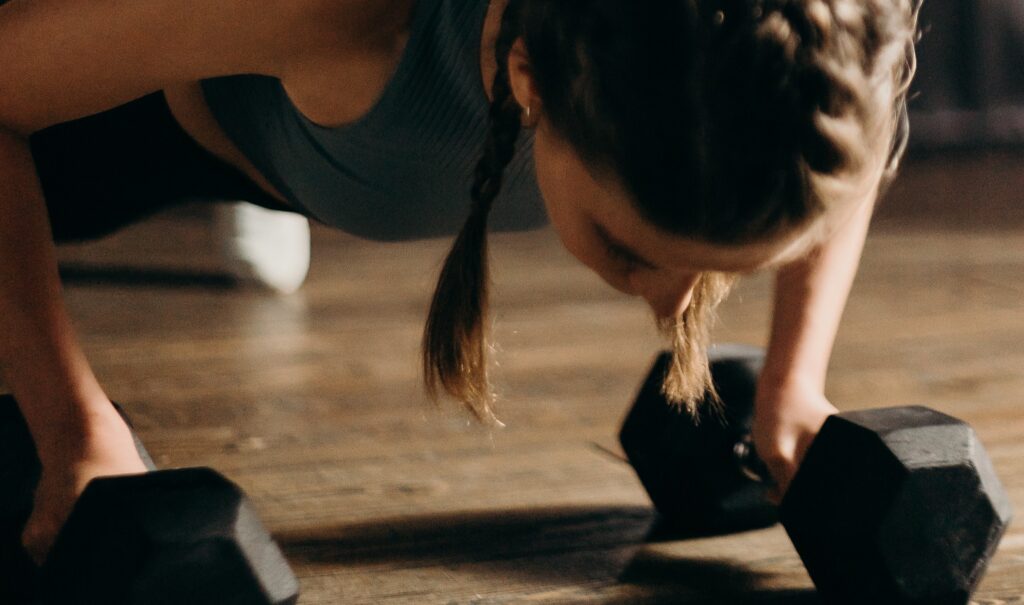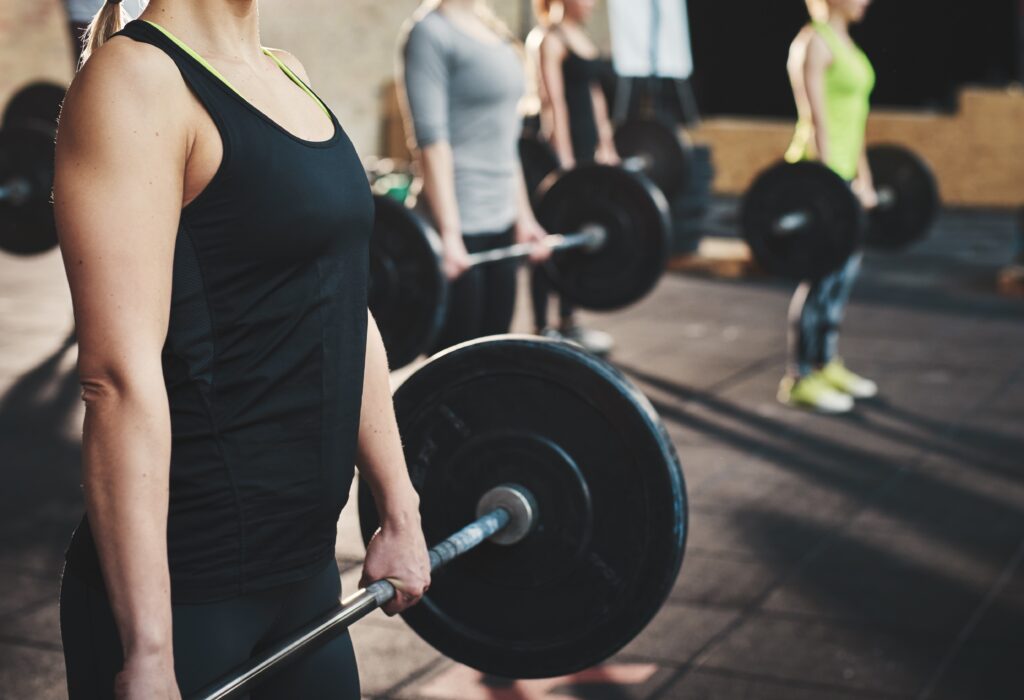
Our coaches love helping women push their exercise limits with confidence and enjoy the benefits that a professionally structured training program can bring. We find that given the right coaching, the right environment, and an increased understanding of how exercise affects women’s bodies, our female clients really enjoy pushing themselves far harder and doing different types of training than they had ever previously imagined. So, lets talk about some of the things that are important when designing exercise programs for women.
One important thing to remember is that there are far more similarities than differences in the recommended way for women and men to exercise. Interestingly, if you take a walk around most commercial gyms, you wouldn’t think this is true! Generally, the strength area is dominated by men, with the classes and cardio areas being predominantly female. This pattern is unfortunate because it is based only on society norms and cultural expectations, rather than human physiology and exercise science. It means that many women are not getting as much as they could out of their exercise time and effort. Plus they often miss out on the significant benefits (and often surprising amount of enjoyment and satisfaction!) that comes with well-structured strength training.
It’s become a bit of a self-perpetuating problem: young women don’t feel comfortable working out in the (male-dominated) weights area, so they get minimal or no proper instruction in strength training. Because they don’t have the opportunity for proper instruction, they never get confident or comfortable in their lifting ability. This then continues as they become a little older, and before we know it they hit their 30’s and 40’s without ever really having done any pure strength work. By this time, the thought of entering the strength area and learning to lift heavier weights is pretty daunting, so it’s back to the classes and cardio…. Now we’re not saying that classes and cardio aren’t great – it’s just that they’re not the whole picture, and the addition of some good strength work has a lot of upside without any of the often-expected downside.
Motivation For Exercise And Training
This might seem like an odd point to focus on, but we always find that understanding a client’s motivation for wanting to exercise is critical to their long-term success. This is true for all clients, women and men, however we find that it’s especially important when working with our female clients. Why? Because breaking down some common misconceptions and helping women understand how certain types of exercise will, and will not, change their bodies, is vital to help them really engage with the most effective exercise program for them.
The most common female exercise misconceptions that we find with clients are around weight loss, body shape and “bulking up”. We’re going to generalise here to illustrate a point, so please don’t think that we’re stereotyping why all women want to exercise! We know that many women exercise for the general health benefits, mental health reasons, and female athletes have specific performance-related strength and conditioning goals, however a high proportion of our female personal training clients initially come with an exercise mindset along the lines of;
“I want to lose weight so I need to burn lots of calories, and the best way to do this is by doing lots of cardio.”
“I want to “tone up” my body, and the best way to do this is by doing lots of repetitions using light weights.”
“If I lift bigger weights I’ll “bulk up” and become more muscular, which is not what I want.”
Combine these beliefs with the typical commercial gym environment where the weights section is dominated by men (and therefore not overly inviting for women), and it’s easy to see why most women just go for the generic group fitness and cardio options. This is a real shame because there are way more effective ways for women to achieve their most common goals of weight-loss and improved body shape. Namely, the inclusion of some well-structured strength training in their regular exercise program.
Why Should Women Do Strength Training?
There are many reasons why doing some pure strength training is highly beneficial for women;
• Strength training is actually a fantastic weight management tool! By increasing your lean muscle mass you increase your resting metabolic rate, meaning that you burn more kilojoules even at rest. This gives you a big boost in achieving and maintaining your desired healthy weight.
• Many women just find that getting stronger is an incredibly empowering and confidence-boosting process. This is often an un-expected benefit, but one of the most common and powerful outcomes that our female clients talk to us about.
• Preserving or increasing bone density and muscle mass, which are especially important to maximise during early/mid-life and preserve with aging. This helps you avoid problems like osteoporosis and reduces your risk of falls later in life (increased strength is associated with greater stability and reduced falls risk).
• Injury prevention: Females have up to 9x times greater risk of non-contact ACL (knee ligament) tears. Predisposing biomechanical factors such as a wider pelvis (Q-angle) which increases rotational forces at the knee, greater quadriceps dominance, ligament laxity and generally lower physical strength exposes females to this increased risk of ACL tears. Women are also more likely to experience patellofemoral (knee-cap) pain. A balanced strength and movement skill training programme has consistently proven to be effective in reducing the risk of these common and potentially season-ending injuries.
• Strength training can help you prevent or manage Type 2 Diabetes. By Increasing your lean muscle mass your body’s metabolism is increased, which helps your body keep blood glucose levels under control. Plus a lower fat-to-muscle ratio reduces the amount of insulin you need in your body (Diabetes Australia).

Won’t Women “Bulk Up” If They Lift Heavier Weights?
In short, no. Why? Because the amount of muscle gained through strength training is related to the amount of testosterone present, and women have far less testosterone than men (only about 5%). So in general, whilst any muscle that is exercised to exhaustion regularly will get bigger no matter what gender you are, the muscle mass gained by women will be far less than by men. It’s actually really hard for women to accumulate large increases in muscle mass! So women really don’t need to be worried about looking overly muscled with regular strength training, but should instead focus on the huge benefits that this type of training brings.
As a side note, a lot of women want to look “toned”. What we need to remember is that looking toned is actually achieved when we have good muscle mass covered by only a moderate amount of fat. “Toned” does not mean not having good muscle mass!
The Main Message – Women Should Include Strength Training In Their Exercise Program
The main message from this discussion is that strength training (resistance/weights training) is highly beneficial for women, and they do not have to worry about the common concern of “bulking up” or looking too muscled.
• By increasing lean muscle mass it is actually highly effective in helping achieve a toned body shape and optimal body composition.
• When we look at human physiology and exercise science research we see that women get every bit as much benefit from strength training as men however, unfortunately, many women never get to enjoy these benefits because of societal norms and expectations.
• The psychological benefits of increased confidence and feeling empowered are often not thought about beforehand, but are among the most common and significant benefits that our female clients talk about once they start including some strength work in their program.
Obviously there are many other factors to consider apart from just strength training. Getting on the right diet is a vital part of achieving and maintaining a healthy body weight, as well as fuelling your body for training and sports performance. There are also some more subtle differences in the way we structure exercise programs for women as opposed to men, for example differences in upper versus lower body strength, recovery periods, hormonal considerations and sometimes exercise technique. However let’s leave these topics for another time, and for now just remember that strength training should be part of every women’s exercise routine!
Keen to Work With A Trainer Who Really Knows About How To Train Women?
At Central Performance we have coaches with a special interest and experience in training women of all ages and fitness levels. All of our coaches are university-qualified exercise physiologists or physiotherapists, giving you the confidence of knowing that you’re working with a highly trained professional. We help our female clients achieve a wide variety of goals including;
• Weight management and body composition
• Increased energy levels and enhanced overall health and fitness
• Injury recovery and prevention
• Sports-specific strength and conditioning
We provide a welcoming and friendly environment with 1:1 and small-group (max 6 people) sessions. Whether you’ve never trained before, maybe used to be a gym regular but then had a few years off due to kids or career, or really enjoy the gym but have never had the opportunity to add an effective strength program into your training, we can help.

Senior Physiotherapist
Masters In Sports & Exercise Medicine

Accredited Exercise Physiologist
Masters In Exercise Physiology

